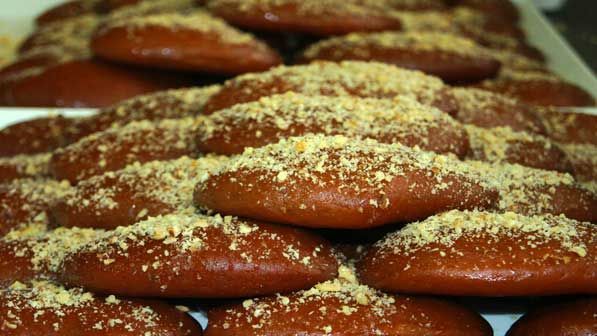

The Christmas table!
Christmas is the most important celebration of the year, bringing people a message of love, hope and solidarity. During the holidays, all houses in Athens and the rest of the country are decorated. Women make traditional delicacies, like kourampiedes, melomakarona and diples (Greek sweets), and everyone keeps the home always open for relatives and friends.
There are many traditional recipes that vary depending on the region. Some of the most popular dishes are turkey stuffed with chestnuts, pork with celery or prunes, rice with chestnuts and pine nuts, roasted pork with white wine and mustard, and salads with fresh vegetables and pomegranate. Kourampiedes, diples and melomakarona are everyone’s favorite sweets. On New Year’s eve, the head of the house cuts a special cake, and whoever finds the coin hidden inside it will have good luck for the entire year.
Here are some of the most popular and delicious Christmas recipes!
In a deep pot, melt 1/3 of the butter, add the onion, and sauté lightly.
Add the breadcrumbs then gradually pour in the warm milk while stirring, until the mixture thickens.
Add the parsley and the pine nuts and remove from heat. Add the chestnuts and the raisins.
Sprinkle the cavities of the bird with salt and pepper and add the stuffing. Sew it and put the turkey in a pan. Pour some lemon juice over it, sprinkle with salt and pepper, add the melted butter and bake at 160ο C, covered with buttered oven paper.
Bake it for at least 4 hours, and serve it in a round platter, along with roasted baby potatoes.
If you want, you can carve it before serving, with the stuffing and the gravy poured over it.
Secret tip! You can also stuff the turkey with sour apples, chopped celery, sage, and onion.
Or alternatively, with dried prunes, apricots, figs, raisins, pine nuts, diced sour apples, and sausage.
With a sharp knife, slice the turkey breast and stuff it with coarsely chopped cooked chestnuts, together with the pine nuts, raisins, rice, and some salt and pepper.
Then wrap it as a roll and secure it with a thread. Place it in a pan, add the white wine and bake it at medium heat for approximately an hour and a half.
When it’s ready, remove from the oven and let it cool. Then cut it in thin slices and serve it in a platter.
Serve with boiled carrots and the leftover stuffing.
Beat the margarine with the corn oil, sugar and orange juice. Stir the cognac with the baking soda and add it in the mix.
Beat the mix for at least 5 minutes and then add flour –previously mixed with baking powder-, until you have a smooth dough. Separate into walnut size pieces and stretch them out to become circular.
Thoroughly stir the stuffing ingredients and start placing half teaspoon bits in each dough piece. After closing them, place them in a pan covered with oven paper.
Lightly incise the surface with a small knife and bake at 180ο C for approximately 20 minutes.
When cool, dip them in hot syrup and place them in a pan to drain. Then serve them in a platter and sprinkle with chopped walnuts.
Thoroughly mix the butter with the sugar and then add the egg yolks.
Add the almonds, cognac (or orange juice), and the vanilla powder. Continue beating the mix and then gradually add the flour until it’s homogenous.
Give the kourabiedes the shape of your choice. Place them in a pan covered with oven paper and bake at 180ο C for 15-20 minutes.
As soon as you remove them from the oven, sprinkle them with rosewater, place them in a platter and sprinkle again with plenty of powdered sugar.
In a deep bowl, place the flour and create a small hole in the centre. Add beaten eggs, the sugar, lemon zest and olive oil.
Knead well, until the dough is firm. Divide the dough in equal sections and create thin, square pieces.
Heat the corn oil well and fry the dough pieces until golden brown. You can give them various shapes.
Simmer the honey together with the sugar and remove the foam. Then, place diples in a platter and pour the syrup over. Finally, sprinkle them with cinnamon and walnuts.
Place sugar and margarine in a mixer and beat well. Add the eggs, the vanilla and the zest.
Continue beating and gradually add the flour and milk, alternating.
Add the soaked and drained raisins, and sprinkle with flour so they won’t stick to the bottom of the baking pan.
Pour the mix in a buttered and floured baking pan. The pan should be deep enough, to allow the dough to rise. Bake the cake at 180ο C.
Dip a knife in the cake. If it comes out dry, it’s ready. Let it cool, remove from the baking pan and sprinkle with powdered sugar.
Don’t forget to hide the lucky coin in the cake!
Ingredients
Directions
In a deep pot, melt 1/3 of the butter, add the onion, and sauté lightly.
Add the breadcrumbs then gradually pour in the warm milk while stirring, until the mixture thickens.
Add the parsley and the pine nuts and remove from heat. Add the chestnuts and the raisins.
Sprinkle the cavities of the bird with salt and pepper and add the stuffing. Sew it and put the turkey in a pan. Pour some lemon juice over it, sprinkle with salt and pepper, add the melted butter and bake at 160ο C, covered with buttered oven paper.
Bake it for at least 4 hours, and serve it in a round platter, along with roasted baby potatoes.
If you want, you can carve it before serving, with the stuffing and the gravy poured over it.
Secret tip! You can also stuff the turkey with sour apples, chopped celery, sage, and onion.
Or alternatively, with dried prunes, apricots, figs, raisins, pine nuts, diced sour apples, and sausage.
With a sharp knife, slice the turkey breast and stuff it with coarsely chopped cooked chestnuts, together with the pine nuts, raisins, rice, and some salt and pepper.
Then wrap it as a roll and secure it with a thread. Place it in a pan, add the white wine and bake it at medium heat for approximately an hour and a half.
When it’s ready, remove from the oven and let it cool. Then cut it in thin slices and serve it in a platter.
Serve with boiled carrots and the leftover stuffing.
Beat the margarine with the corn oil, sugar and orange juice. Stir the cognac with the baking soda and add it in the mix.
Beat the mix for at least 5 minutes and then add flour –previously mixed with baking powder-, until you have a smooth dough. Separate into walnut size pieces and stretch them out to become circular.
Thoroughly stir the stuffing ingredients and start placing half teaspoon bits in each dough piece. After closing them, place them in a pan covered with oven paper.
Lightly incise the surface with a small knife and bake at 180ο C for approximately 20 minutes.
When cool, dip them in hot syrup and place them in a pan to drain. Then serve them in a platter and sprinkle with chopped walnuts.
Thoroughly mix the butter with the sugar and then add the egg yolks.
Add the almonds, cognac (or orange juice), and the vanilla powder. Continue beating the mix and then gradually add the flour until it’s homogenous.
Give the kourabiedes the shape of your choice. Place them in a pan covered with oven paper and bake at 180ο C for 15-20 minutes.
As soon as you remove them from the oven, sprinkle them with rosewater, place them in a platter and sprinkle again with plenty of powdered sugar.
In a deep bowl, place the flour and create a small hole in the centre. Add beaten eggs, the sugar, lemon zest and olive oil.
Knead well, until the dough is firm. Divide the dough in equal sections and create thin, square pieces.
Heat the corn oil well and fry the dough pieces until golden brown. You can give them various shapes.
Simmer the honey together with the sugar and remove the foam. Then, place diples in a platter and pour the syrup over. Finally, sprinkle them with cinnamon and walnuts.
Place sugar and margarine in a mixer and beat well. Add the eggs, the vanilla and the zest.
Continue beating and gradually add the flour and milk, alternating.
Add the soaked and drained raisins, and sprinkle with flour so they won’t stick to the bottom of the baking pan.
Pour the mix in a buttered and floured baking pan. The pan should be deep enough, to allow the dough to rise. Bake the cake at 180ο C.
Dip a knife in the cake. If it comes out dry, it’s ready. Let it cool, remove from the baking pan and sprinkle with powdered sugar.
Don’t forget to hide the lucky coin in the cake!


